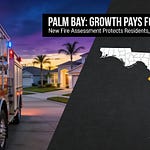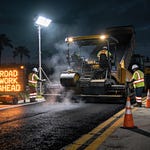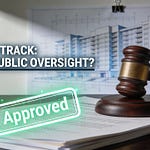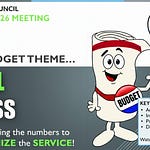Palm Bay, FL - The City of Palm Bay held its first budget workshop for the upcoming Fiscal Year 2026 on Thursday, May 29, 2025, signaling a new, earlier start to the annual budget development process. City staff, led by the Finance Department, presented an overview of departmental requests, capital needs, and a revamped approach aimed at greater collaboration, transparency, and strategic alignment with City Council priorities.
The meeting, intended as a high-level strategic planning session, provided Council members and the public with an initial look at the financial landscape and the numerous needs facing the city. The formal acknowledgment of the City's Annual Comprehensive Financial Report for FY 2023-2024 was deferred to the next budget workshop in July due to a last-minute clarification needed from the City's audit team, which is currently undergoing a merger.
A New Era for Budget Development 🌟
Assistant Finance Director Angelica Collins, along with her team including Budget Program Administrator Jessica Hinchman, Capital & Asset Program Administrator Sean Spillers, and Budget Analyst Shane Byrd, outlined a significant evolution in how Palm Bay will approach its budget.
"Tonight is more of a high level. We want to talk about strategic planning," Collins stated, emphasizing a shift from past practices.
Jessica Hinchman detailed the transition:
Past (FY25 and Prior): A City Manager-driven process with year-round budget amendments and sometimes underdeveloped requests.
Current (FY26 - Hybrid Approach): Focus on department initiatives, limiting budget amendments, and earlier Council inclusion through workshops and one-on-one meetings. A key change is that the adopted budget will now reflect multi-year project costs for a truer fiscal picture.
Future (FY27 Onwards): A "Stakeholder Driven" model, kicking off as early as January with Council to set goals. The new ERP system will even allow departments to only submit requests aligning with these established goals. The aim is a "financially feasible budget with attainable goals and real focus on capital planning."
The Finance Department's efforts have been recognized nationally, receiving the Distinguished Budget Presentation Award from the Government Finance Officers Association (GFOA) for 34 consecutive years, with special recognitions for budget process and performance measures in the last two years.
For readers interested in a visual summary of the City’s budget requests and allocations, you can explore the interactive FY2026 Budget Dashboard. The dashboard provides charts and breakdowns of total requests, priority needs, and general fund allocations, making it easy to see where the city’s financial priorities lie.
Access the Palm Bay FY2026 Budget Dashboard here.
Council Priorities Take Center Stage 🎯
Early discussions with Council members revealed key areas of focus for the FY 2026 budget:
Road Capacity & Infrastructure: This was a near-universal top priority.
Public Safety: Needs include police vehicles, new fire stations, and the new police headquarters.
Stormwater & Utilities: Addressing ongoing needs in these areas.
Financial Reserves: One council member suggested working towards a six-month reserve, up from the current four-month target.
Accountability & Project Management: Ensuring efficient use of funds.
FY 2026 Budget: The Knowns & Initial Requests
Payroll & Pensions:
Contractual salary increases are set for Fire (IAFF - 10%) and Police (FOP - varying from ~5% to ~8% including merit steps). Negotiations with NAGE (general employees) are pending, and staff recommended a contingency fund for these.
Pension costs continue to rise significantly, with a projected $2.5 million increase for FY26. Police pensions have risen over 200% since FY23, and Fire pensions by 82% in the same period, partly due to the addition of 30 FTEs in each department.
Budget Guidelines & Departmental Requests:
Under City Manager Matthew Morton's direction, departments were given an "operating maximum" based on their FY25 budget (less one-time expenses) and asked to focus on "continuing current level of service" and "what you must do next year," not a "wish list." No new Full-Time Equivalents (FTEs) were included in initial departmental requests, only reclassifications. A city-wide vacancy snapshot revealed approximately 130 full-time vacancies, with Police (43), Utilities (42), and Public Works (20) having the most.
Shane Byrd, Budget Analyst, presented the staggering volume of requests:
Total Requests (FY26-FY30): Over 407 requests totaling $234.7 million.
Priority 1 Requests (Mandated/Contractual): 37 requests.
FY26 Impact: $11.7 million across all funds.
General Fund FY26 Impact: $3.4 million (Fire: $1.3M, Public Works: $824K, IT: $376K).
Recurring Costs (FY26-FY30): $12.7 million for General Fund Priority 1 items alone.
Other Requests (Departmental Priorities):
FY26 Impact: $90 million across all funds.
General Fund FY26 Impact: $32 million (Parks & Facilities: $14.4M, Fire: $11.8M, Public Works: $3.2M, Police: $1.3M).
Recurring Costs (FY26-FY30): $18 million for General Fund "other" requests.
The presentations highlighted that operating costs make up the vast majority of Priority 1 requests for the General Fund (87%).
Spotlight on Departmental Needs 🔦
Several department heads detailed their "Priority 1" and other significant requests:
Fire Department:
Priority 1: Uniforms/bunker gear (IAFF contract), LifePak 35 contract, paramedic sponsorships, radio maintenance, backbone billing increase (county radio system), annual BLS/ACLS renewals, air bottle testing.
Other Major Requests: Heavy Rescue vehicle ($1.89M), four new Fire Engines/Quints (each ~$1.8M). Chief Stovall emphasized the age of current apparatus (some 2.5 times their expected life) and the benefits of Quints for quicker deployment and potential ISO rating improvements (a score that reflects a fire department's capabilities and can influence insurance rates), which could lower residents' insurance premiums. Delivery times for new apparatus are lengthy (2-4+ years).
Public Works:
Priority 1: Increased electrical services costs for traffic signals/pumps/streetlights, mowing services contract.
Other Major Requests: Traffic signal respans (many over 20 years old), Myovision video detection system, and numerous vehicle/equipment replacements due to age and high maintenance costs (e.g., grapple truck, rubber tire excavator, tractor, flatbeds, skip steer – one tractor cost $42K initially and has incurred $127K in repairs).
Parks & Facilities:
Priority 1: Onboarding contractual costs for the new Building E and Fire Station 7 (utilities, janitorial, maintenance), janitorial services for community centers and Turkey Creek.
Other Major Requests: Sports lighting upgrades at Liberty Park, Nungesser Park, and Knecht Park (totaling over $4.7M due to outdated, inefficient, non-hurricane rated fixtures), Turkey Creek boardwalk replacement ($1.7M), Fred Poppy Regional Park repaving ($966K) and ballfield drainage ($690K), softball turf replacements at Liberty and Fred Poppy Parks, Liberia Park ADA upgrades, Nungesser Park tennis court replacement.
Information Technology:
Priority 1: ERP software renewals, edge switch upgrades (aging equipment, 8 years old vs. 6-year lifespan, identified as a risk).
Other Major Requests: Expansion of security cameras and access control to more city facilities (including $330K for fire stations), GPS in city vehicles.
Recreation: AUE staffing (contractual for aquatic center/camps), vehicle wraps for program promotion, pool chemicals, floor scrubber, gym equipment replacement.
Police Department:
Priority 1: Axon body cam/taser contract (Year 3 of 5), Axon Standards (new professional standards software), replacement of three vehicles deemed total losses (2 SUVs, 1 crime scene van).
Other Major Requests: Primarily vehicle replacements to stay on track with the fleet replacement plan (10 in top requests, 7 additional requested). Deputy Chief DC emphasized the fleet is in its best shape in years but needs continued investment.
Legislative: Upgrade to Council Chambers broadcast system (current system from 2018, no longer updatable), reclassification of a secretary position.
Human Resources: $5,000 for recruitment "swag" for job fairs.
Procurement: Office remodel due to current space constraints.
Capital Program: Building Palm Bay's Future 🏗️
Sean Spillers, Capital & Asset Program Administrator, presented the FY26 capital requests:
Total Capital Requests (All Funds): $41 million.
General Fund: $22.2 million (largest portion).
Utilities Fund: $14.7 million.
General Fund Breakdown:
Capital Outlay (Machinery & Equipment): $16.1 million (73%), with Fire ($11M) and Public Works ($2.5M) having the largest needs.
Capital Improvement Projects (CIP): $6 million (27%), primarily for Parks & Facilities ($5M) and IT ($961K).
Governmental Capital Requests by Sector (All Funds, including GO Bonds & Impact Fees):
Transportation: $35.3 million (61%) - primarily funded by GO Bonds and impact fees.
Public Safety: $12.6 million (22%) - mostly machinery/equipment.
Physical Environment (Parks): $8.4 million (15%).
Information Technology: $1 million (2%).
Future capital planning aims to maintain a five-year plan, use CPI for forecasting, and conduct revenue/cash flow analysis to fund future expenditures.
Council Deliberations & Public Input 🗣️
City Council members engaged actively with the presentations, raising key questions and stating their priorities:
Mayor Rob Medina: Advocated for sound baffles at Ted Whitlock Community Center, new chairs for residents in Council Chambers, potentially adding another Veteran Services Officer (VSO), and reiterated his top priorities: ITS, and four-laning Malabar Road and Heritage Parkway. He also suggested Public Works explore acquiring airboats for flood response and canal access.
Deputy Mayor Mike Jaffe: Requested department heads to elaborate on their Priority 1 requests, leading to detailed explanations.
Councilman Chandler Langevin: Inquired about the possibility of using Space Coast Daily for legally required public notices instead of Florida Today, citing paywall concerns with the latter. The City Attorney will research the feasibility. He also stressed the importance of seeing road widening and infrastructure projects in budget discussions.
Councilman Mike Hammer: Stated his focus on roads and public safety. He raised questions about coordinating Parks & Facilities requests (like Fred Poppy Regional Park repaving/drainage) with the ongoing master plan for the park to avoid redundant spending.
Councilman Kenny Johnson: Praised new City Manager Morton's quick grasp of city issues. He pushed for follow-up on liquidated damages for past road paving issues (e.g., Jupiter Blvd). He questioned the frequency of past budget amendments and travel budget approvals. He advocated for zero-based budgeting in the future (staff noted FY27 might be more feasible due to the current ERP transition) and strongly requested an operational audit be included in the FY26 budget. He also raised concerns about high vacancy rates in Police, Utilities, and Public Works, questioning the efficiency and exploring alternatives like subcontracting. This led to a detailed discussion with Deputy Police Chief DC, who clarified that while sworn officer vacancies appear high (30), many positions have conditional offers or are in academy, with active recruitment for 16 officer positions. He also confirmed the City is pursuing repayment from officers who left after receiving sign-on bonuses.
Public Comments:
Susan Connelly: Thanked the Council and staff for the "most robust discussion on the budget" she's witnessed in years and praised the new transparent approach. She requested improvements to the "Ask Palm Bay" online service for easier access to current city information, like the name of the interim City Manager and actual budget documents.
Bill Batton: Questioned automatic contractual 10% raises, preferring performance-based increases. He humorously suggested saving money on ballpark lighting by not having night games. He commended the new approach to limit year-round budget amendments and expressed concern about potential future decreases in tax revenue, urging proactive planning.
Navigating Financial Realities 📉
A significant portion of the discussion revolved around the city's financial future. City Manager Morton noted that requests currently outweigh available funding. Finance staff highlighted that the City's millage rate has been in a state of decline relative to the "rollback rate" (the rate that would generate the same ad valorem revenue as the previous year, excluding new construction). While new construction has provided revenue, this is declining. Assistant Finance Director Collins projected that if current trends continue, Palm Bay could be below the rollback rate by FY2027, meaning the city would collect less property tax revenue year-over-year even with the 3% cap, posing significant challenges for a city reliant on property taxes for 75% of its General Fund.
Councilman Hammer prompted a discussion about why the millage rate remained the same between FY23 and FY24. Collins explained that the Council at that time chose to exceed the 3% cap due to an emergency declaration for fire and safety needs (staffing, vehicles) based on response time analysis.
Important Upcoming Budget Dates 📅
The budget process is ongoing, with several key dates ahead:
July 8, 2025: Next Budget Workshop (Mid-Year Review & FY26 Proposed Budget Data, including property valuations from the Property Appraiser due July 1st).
July 17, 2025: Regular Council Meeting (Certification of Taxable Value, Proposed Millage Rate Decision, Setting Public Hearing Dates).
July 31, 2025: Target for distribution of the FY26 Proposed Budget document.
August 5, 2025: Optional Budget Workshop if needed.
September 10 & 24, 2025 (Tentative): First and Second Public Hearings to formally adopt the budget and millage rate. These dates are statutorily required and must adhere to strict advertising timelines.
The Finance Department aims to present a comprehensive and well-vetted proposed budget in July to facilitate a smooth adoption process. City Manager Morton emphasized the next 30 days would involve staff getting creative to find solutions and align priorities with available resources.
Charting Palm Bay's Fiscal Path 🗺️
The initial FY26 budget workshop has set a new, more transparent course for Palm Bay's financial planning. The primary challenge ahead is clear: balancing a multitude of essential departmental needs and Council priorities—from public safety enhancements and infrastructure upgrades to maintaining city services—with the current financial realities and a potentially tightening revenue stream. The upcoming July 8th budget workshop will be a critical next step, where residents can expect to see more concrete proposals and a clearer picture of how the City intends to navigate these challenges. Continued public engagement will be vital as these important decisions are made.
Curated by AI and fact-checked by The Palm Bayer.











